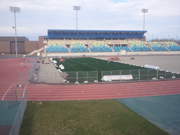
Features
Profiles
Moncton gets its sports fields ready for upcoming FIFA championships
May 30, 2014 By Mike Jiggens
MONCTON, N.B. is perpetuating its reputation as a sports mecca in Atlantic Canada.
For three of the past four years, the city has played host to a trio of neutral-site Canadian Football League regular season games at its marquee Moncton Stadium on the University of Moncton campus. All three contests were smash successes.
Now, the city will be the host this August to the FIFA (Fédération Internationale de Football Association) Under 20 Women’s World Cup soccer championship, along with Edmonton, Toronto and Montreal, and will be one of six Canadian cities at which the 2015 FIFA Women’s World Cup will be played in June and July.
The other cities are Vancouver, Edmonton, Winnipeg, Ottawa and Montreal.
“When we put in the bid and were actually awarded it, they (FIFA) liked the fact that we had natural fields,” said Rod Higgins, general manager of parks and leisure services for the City of Moncton. “Then, a few months later, they had a more detailed evaluation and because the other host cities were artificial, we had to convert our natural fields to artificial so that someone coming out of a certain pool wouldn’t have an advantage or disadvantage.”
The university stadium, which seats about 10,000 people yet is expandable to potentially double its capacity, had to be converted to an artificial playing surface. Only the end zones had previously been synthetic. Additionally, two high school fields in the city have been constructed to synthetic turf to serve as practice fields as part of a partnership project involving the city, the province and the schools themselves.
The city covered the cost of the synthetic turf for the high school fields—Harrison Trimble High School and MacNaughton High School—yet committees of community volunteers representing the schools raised $1.8 million to fund such additions as lighting, scoreboards, bleachers, fencing and washroom buildings.
“It was a real community project with corporations donating things,” Higgins said. “Volunteers raised money and the province kicked in and the city kicked in some. It was really a true community spirit model.”
For this summer’s under 20 women’s championship, Moncton will be the host for the Group C pool which includes England, South Korea, Mexico and Nigeria.
Canada is part of the Group A pool, along with Ghana, North Korea and Finland, and will play its games in Toronto.
Moncton will also be the venue for two other contests: a group B match between the United States and China and a Group A game between Ghana and Finland.
In all, 10 matches will be played at Moncton Stadium, including a quarter-final game and a semi-final contest.
Officials representing the four countries from the Group C pool paid a visit to Moncton in March to assess the playing facilities and left impressed by what they saw.
Higgins said city council has thrown its support in recent years behind the development of its sports facilities.
“We really believe we need to be in the sport tourism game and attract events and tournaments.”
In May, the city was host to a major women’s softball tournament which attracted 28 teams. With rosters of 15 players apiece, along with team supporters, the city’s hotels and restaurants benefited greatly.
“We truly believe sports tourism is important,” Higgins reiterated.
According to the Canadian Soccer Association, the impact of the two FIFA events is expected to see an infusion of about $27 million into the city, based on research by the Canadian Sport Tourism Alliance.
The conversion of the two high school fields was done last year while the resurfacing of Moncton Stadium was only recently completed. Higgins said the conversion of the latter field was slightly more problematic because it had previously served as the venue for IAAF 2010 World Junior Track and Field Championships and continues to serve as a qualifying venue for the Canadian Youth Track and Field Championships.
Higgins said the sticky issue is that throwing events such as the javelin and discus are preferred to be contested on natural turf, but he added that if the city should ever be host to a major international event that repairs could be made later to damaged portions of the synthetic surface.
“At that level, these guys are pretty much throwing the javelin in a set area, so we could just take out the carpet in that spot and replace it.”
To accommodate regional and national events, a practice field adjacent to Moncton Stadium has been upgraded with superior natural turf so that throwing events can take place there.
Work done at Moncton Stadium, its practice field next door and the two high school fields was motivated by the FIFA events, “but it’s a great legacy to be left behind,” Higgins said. “The community will benefit immensely from these fields.”
The high school fields will serve multi-sport purposes, including soccer, rugby and football. A reciprocal agreement has been established between the city and the schools for which the city will look after their maintenance in exchange for the schools allowing the fields to be used by the community.
Contracted to do the synthetic conversion work at Moncton Stadium was Turf Masters Ltd. of Elderbank, N.S.
Print this page